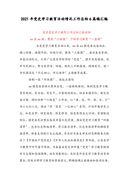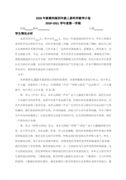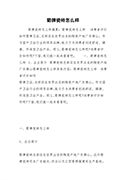“soooooooosweet”投稿了15篇腊八节英语作文及翻译,下面是小编整理后的腊八节英语作文及翻译,希望对大家有所帮助。
篇1:英语腊八节相关作文
Laba is celebrated on the eighth day of the last lunar month, referring to the traditional start of celebrations for the Chinese New Year. “La” in Chinese means the 12th lunar month and “ba” means eight.
Legends about the origin of this festivity abound. One holds that over 3,000 years ago sacrificial rites called “La ” were held in the twelfth lunar month when people offered their preys to the gods of heaven and earth. The Chinese characters for prey and the twelfth month were interchangeable then, and ever since “La” has been used to refer to both.
Since the festival was held on the eighth day of the Last month, people later appended the number eight (“ba” in Chinese), giving us the current Laba .
The majority Han Chinese have long followed the tradition of eating Laba rice porridge on the Laba Festival. The date usually falls in mid-January.
篇2:英语腊八节相关作文
Northerners prefer to use glutinous rice, red beans, dates, lotus sees, dried longan pulp, walnuts, pine nuts and other dried fruits in their porridge; southerners like a salty porridge prepared with rice, soybeans, peanuts, broad beans, taro, water chestnuts, walnuts, vegetables and diced meat. Some people like to add cinnamon and other condiments to inject flavor.Controlling the heat is of great importance in the outcome. At the start, the flame must be high, but the fire is then turned down to let the porridge simmer until it begins to emit avery delicious smell. The process is time-consuming but not complicated.
Laba porridge is not only easy to prepare, but also a nutritious winter food because it contains amino acids, protein and other vitamins people need. Cooked nuts and dried fruit are good for smoothing nerves, nourishing one’s heart and vitality, and strengthening the spleen. Perhaps that is why it is also called babao (Eight Treasure) porridge.
篇3:腊八节英语作文
Theeight-treasure porridge was first introduced to China in the Song Dynasty about900 years ago.
八宝粥最开始出现是在9前的宋朝。
Buddhismwas well accepted in the areas inhabited by the Han Chinese, who believed thatSakyamuni, the first Buddha and founder of the religion, attained enlightenmenton the eighth day of the twelfth month. Sutras were chanted in the temples andrice porridge with beans, nuts and dried fruit was prepared for the Buddha.With the passing of time the custom extended, especially in rural areas wherepeasants would pray for a plentiful harvest in this way.
那时候佛教已经被信奉佛祖释迦牟尼的汉族人广泛接受。传说佛祖在十二月初八受到教化。人们会为佛祖准备好有豆子、坚果和干果的大米粥,寺庙里也会唱起佛经。随着时间的推移,这种习俗就传播出去了,尤其在农村,会用会用花生煮粥祈祷一年的好收成。
篇4:腊八节英语作文
There is, however, another touching story. When Sakyamuni was on his way into the high mountains in his quest for understanding and enlightenment, he grew tired and hungry.
Exhausted from days of walking, he passed into unconsciousness by a river in India. A shepherdess found him there and fed him her lunch—porridge made with beans and rice. With such nourishment he was able to continue his journey. After six years of strict discipline, he finally realized his dream of full enlightenment on the eighth day of the twelfth lunar month.
Ever since, monks have prepared rice porridge on the eve ad held a ceremony the following day, during which they chant the sutras and offer porridge to Buddha. Thus, the tradition of eating laba porridge was based in religion, though with time the food itself became a popular winter dish especially in cold northern China.
篇5:腊八节英语作文
Labais celebrated on the eighth day of the last lunar month, referring to thetraditional start of celebrations for the Chinese New Year. La in Chinese meansthe 12th lunar month and ba means eight.
腊八是农历十二月的第八天,是欢庆春节的开始。汉语里,“腊”的意思是第十二个月,“八”的意思是八。
Legendsabout the origin of this festivity abound. One holds that over 3,000 years agosacrificial rites called La (腊) were held in the twelfth lunar monthwhen people offered up their preys to the gods of heaven and earth.
关于这个节日的起源有很多种说法。有一种说法是大约30前,一种祭祀仪式叫做“腊”,会在农历十二月举行。人们向天上和地下的神献出他们的'猎物。
The Chinesecharacters for prey (猎) and the twelfth month (腊 La) were interchangeable then, and ever since La has been used torefer to both. Since the festival was held on the eighth day of the Last month,people later appended the number eight (ba in Chinese), giving us the currentLaba.
那时候,表示猎物的汉字“猎”和表示农历十二月的“腊”是可以通用的。从那时候起,“腊”就用来指这两种意思了。因为这个节日是在最后一个月的第八天举行的,后来人们就加上了“八”,于是就有了现在的腊八。
篇6:腊八节英语作文
腊八节英语作文
the twelfth night, house started to warm up. Father will yellow rice, rice, red jujube, and red bean with warm water bubble up, then use sand pot in the fire boil chestnuts. Father said, do it with the five kinds of materials to, suggesting the grain and make it plentiful in the coming year. We several elder brother in the father's side, like a few didn't plunge wings of the bird, mother bird such as feeding. Chestnut cooked, father of the hand of the dry with peel it off the brown scale, will sweet and the pulp, stood in turn into our mouth to, but he also won't a taste. At this time, the mother sat cross-legged on the kang, in bright light cover, for her this several children rushed the clothes of the New Year. Orange cover light column straight with white paste the moon roof, ceiling and there is a small, round the moon. Small moon ?
篇7:腊八节英语作文
Because before you go out to play in the morning, mother will buy the ingredients for rice porridge, soaking in the water in advance, mother said that cooking fast. So, got home at noon, you can cook on the drink. The laba festival to eat is rich! And I most like to eat braise in soy sauce meat ~ children generally like to eat meat!!!! Oh, mom and dad dont want to say them, because in the long body, eating well is the key!
Today is the laba festival, ask good friends and rice pudding? Very sweet? Ha ha. Who didnt drink I ask you to drink oh ~ home cooked a big pot of today!
In the morning we went out to play, my father and mother do for a long time of car, a bit does not adapt, (we have a little carsick, ah! Lying in the bed as soon as he got home. In the morning to go out and take some photos, but for some reason, didnt, in a scenery is not very good, anyway have no green in winter.
篇8:腊八节英语作文
Theeight-treasure porridge was first introduced to China in the Song Dynasty about900 years ago.
Buddhismwas well accepted in the areas inhabited by the Han Chinese, who believed thatSakyamuni, the first Buddha and founder of the religion, attained enlightenmenton the eighth day of the twelfth month. Sutras were chanted in the temples andrice porridge with beans, nuts and dried fruit was prepared for the Buddha.With the passing of time the custom extended, especially in rural areas wherepeasants would pray for a plentiful harvest in this way.
篇9:腊八节英语作文
The majority Han Chinese have long followed the tradition of eating laba rice porridge on the eighth day of the twelfth lunar month. The date usually falls in min-January and is a traditional Chinese festival.
Legend about the origin of this festivity abounds One maintains that over 3,000 years ago sacrificial rites were held in the twelfth lunar month when people offered up their prey to the gods of heaven and earth. The Chinese characters for the hunt and the twelfth month (lie and la) were interchangeable then, and ever since la has been used to refer to both. Since the festival was held on the eighth day of the last month, people later appended the number eighth (ba in Chinese), giving us the current laba.
Buddhism was well accepted in the areas inhabited Han Chinese, who believed that Sakyamuni, the first Buddha and founder of the religion, attained enlightenment on 12/8. Sutras were chanted in the temples and rice porridge with beans, nuts and dried fruit was prepared for the Buddha. With time the custom extended, especially in rural areas where peasants would pray for a plentiful harvest in this way.
There is, however, another touching story. When Sakyamuni was on his way into the high mountains in his quest for understanding and enlightenment, he grew tired and hungry. Exhausted from days of walking, he passed into unconsciousness by a river in India. A shepherdess found him there and fed him her lunch—porridge made with beans and rice. With such nourishment he was able to continue his journey. After six years of strict discipline, he finally realized his dream of full enlightenment on the eighth day of the twelfth lunar month. Ever since, monks have prepared rice porridge on the eve ad held a ceremony the following day, during which they chant the sutras and offer porridge to Buddha. Thus, the tradition of eating laba porridge was based in religion, though with time the food itself became a popular winter dish especially in cold northern China.
Laba porridge is made with local specialties such as ginkgo fruits, water chestnuts, chestnuts, lotus seeds and red beans in addition to the rice. Actually eight ingredients are used, cooked with sugar to make the porridge wonderfully sweet. Northerners prefer to use glutinous rice, red beans, dates, lotus sees, dried longan pulp, walnuts, pine nuts and other dried fruits in their porridge; southerners like a salty porridge prepared with rice, soybeans, peanuts, broad beans, taro, water chestnuts, walnuts, vegetables and diced meat. Some people like to add cinnamon and other condiments to inject flavor. Controlling the heat is of great importance in the outcome. At the start, the flame must be high, but the fire is then turned down to let the porridge simmer until it begins to emit avery delicious smell. The process is time-consuming but not complicated.
Laba porridge is not only easy to prepare, but also a nutritious winter food because it contains amino acids, protein and other vitamins people need. Cooked nuts and dried fruit are good for smoothing nerves, nourishing one’s heart and vitality, and strengthening the spleen. Perhaps that is why it is also called babao (Eight Treasure) porridge.
篇10:英语腊八节祝福语
Wishyouhappy.Itwins:beautifulflowers,romanticlikethecherryblossom,auspiciouslikesnowflakes,luckonpeachblossom,richracepeony,jasminefragranceclimb!
腊八祝你乐开花:俏丽胜鲜花,浪漫如樱花,吉祥似雪花,运气逢桃花,富贵赛牡丹花,芳香攀过茉莉花!
Tomorrowit,atruckfilledwithhappinesstoclearthewayforsafediscardallthetroubles,sohappywithyouembrace,storingallthewarmthofthecoldaway,thereleaseoflife,feelingsohappyforyoualwayssmile!
明日腊八,装满一车幸福让平安开道,抛弃一切烦恼让快活与你拥抱,存储所有温暖将寒冷赶跑,释放一生真情让幸福永远对你微笑!
Sendyouacoat,peaceisinthefront,thebackishappiness,luckiscollar,wishissleeve,happinessisabutton,pocketfullofwarmth,putiton,letitbewithyoueveryday!TheLabafestival!
送你一件外套,前面是平安,后面是幸福,吉祥是领子,如意是袖子,快活是扣子,口袋里满是温暖,穿上吧,让它相伴你的每一天!腊八节快活!
Tired,pleaseheartshore;wrong,don'tthinkofafterashamed;bitter,onlyknowhowtomeet;hurt,thatstrong;drunk,thatunforgettable;laugh,feelbeautiful;stuffy,LabaFestivalwouldfindmechat!
累了,请将心靠岸;错了,别想到后愧;苦了,才懂得满足;伤了,才明确刚强;醉了,才知道难忘;笑了,才领会俏丽;闷了,腊八节就找我聊聊!
Openmyeyes,Ionlyhaveeyesforyou.ClosemyeyesandIonlyhaveeyesforyou.TheglassesonthebeltfourofmyeyesyouaretheLabaFestival,Iwanttomarryyou!
睁开我的眼睛,我的眼里只有你。闭上我的眼睛我的眼里只有你。带上眼镜我的四个眼里都是你,腊八节我想娶你!
Ihopeyouhappyeverydaywaslikeateapotonthestove,althoughlittleassburnedhot,butstillhappyblowingwhistles,bravingthehappylittlebubbleLabaFestivalhappy!!hehe
盼望你每天都快活得象炉子上的茶壶一样,虽然小屁股被烧得滚烫,但依然吹着开心的口哨,冒着幸福的小泡泡!腊八节快活哦!呵呵
Yen,fullmoon,familyreunion;Lusource,exchequer,isyoursourceofpopularity,and,constantly;love;wish,wouldrather,doeverything!
日圆,月圆,阖家团圆;禄源,财源,是你泉源;人缘,福缘,不断情缘;心愿,甘心,事事如愿!
Quietlytellyouinadvance,theLabaFestivalmygifttoyou:goodchasingyourillness,andhideyourlover,love,painfromyou,happywithyou,everythingdowntoyou!
悄悄地提前告诉你,腊八节我送你的礼物:好事追着你,病魔躲着你,情人深爱你,苦楚远离你,开心跟着你,万事顺着你!
PolyHimalayasunshine,breezefromtheremotestcornersoftheglobe,antagonisticGangdisemountainsblessings,suckingBillGatesbuck,asagifttoyou,theLabafestival!
聚喜马拉雅之阳光,拢天涯海角之清风,拮冈底斯山之祝福,吸比尔盖茨之财气,作为礼物送给你,腊八节快活!
Darkstarmuchless,freeresourcesonlinedegreeseastsmilemuchtroubleislittle,littletimemoodofloneliness,whenagoodmoodallnaturalgood!Wish:theLabaFestivalwiththewishtorunall!
星多的处所黑暗就少,笑容多的处所烦恼就少,寂寞少的时候心情就好,心情好的时候一切自然好!祝:腊八节一切随着心愿跑!
Iclickonthespringtoseeyoursmile,Icopiedyoursmilingfacepasteinmyheart,Idownloadmythoughtssaveitforever,Iopenmymobilephonetosendyouthemostsincereblessing:IwishtheLabafestival!
我点击全部春天看到了你的笑容,我复制了你笑容粘贴在我的心间,我下载我的思念把它另存为永远,我打开我的手机给你送上最真诚的祝福:祝腊八节快活!
Nomatteronthesideoftheroad,sea,sky,goodluckalwaysbewithyou.Whetherpast,present,future,alwaysgiveyouthewarmcare,mayyoubethemosthappymanhappy.Happy,goodluck!
不管在路边,海边,天边,好运一直陪在你身边。无论是过去,现在,将来,一直给你最暖的'关心,愿你成为世界上最开心最幸福的人。笑口常开,好运常在!
Tothankallthefriendsovertheyearsonmykeysupport,especiallyintheLabaFestivalheldbargainactivities!Alwaysinmyhearthasanimportantpositioninthepeople,willbeprovidedbyme$0.1freeSMSblessing.
为答谢各界朋友多年来对我的要害支撑,特在腊八节前举办酬宾活动!凡是在我心中有重要地位的人,都将获得由我供给的价值0.1元免费祝福短信一条。
Thefriendistheday,thefriendis,withfriendsofindomitablespirit.Friendisthewind,rainfriendisafriend,cansummonwindandcallforrain.Wealthisnotpermanent,friendispermanentwealth!WishtheLabafestival!
朋友是天,朋友是地,有了朋友可以顶天立地。朋友是风,朋友是雨,有了朋友可以呼风唤雨。财富不是永久的,朋友却是永久的财富!祝腊八节快活!
LabaFestivalarrived,Iuseluckymeters,pistachio,beautifulbeans,getrichjujube,perfectbenevolence,flexiblysweet,healthysugar,withoutwatermakeabowlofporridgetoyou,wishyouhappyeveryday!
腊八节到了,我用荣幸运米,开心果,俏丽豆,发财枣,美满仁,如意蜜,健康糖,无忧水做一碗腊八粥送给你,愿你每天都快活!
Asincere,isbetterthanathousandgold;warm,worthamillioninfrost,agreeting,sentawarmandsweet;amessage,sendmeoneheart!WishyourcareerwithoutJingheavenandearth,hastheachievementrow.Friendshipneedsnottospeakinriddles,thinkingofit.Moneyneednottakemuch,enoughontheline.Lifewithoutoverahundredyears,healthontheline.Howmanyfriendsdonotneed,you.GoodfriendswishyouhappytheLabafestival!
一丝真诚,胜过千两黄金;一丝温暖,能抵万里寒霜,一声问候,送来温馨甜蜜;一条短信,捎去我万般心意!愿您事业无须惊天地,有成绩行。友谊无须说谜语,想着就行。金钱无须取不尽,够用就行。生命无须过百岁,健康就行。朋友无须有多少,有你就行。好朋友祝你腊八节快活!
篇11:腊八节的英语作文
Laba rice porridge contains glutinous rice (糯米), red beans, millet, Chinese sorghum, peas, dried lotus seeds, red beans and some other ingredients, such as dried dates, chestnut meat, walnut meat, almond, peanut, etc. Actually eight ingredients(配料、成分) are used, cooked with sugar to make the porridge tasty.
Northerners prefer to use glutinous rice, red beans, dates, lotus seeds, dried pulp(果肉), walnuts (胡桃), pine nuts and other dried fruits in their porridge; southerners like a salty porridge prepared with rice, soybeans(大豆), peanuts, broad beans, taro, water chestnuts, walnuts, vegetables and diced meat. In the north, it is a dessert with sugar added; in the south, salt is put in. Some people like to add cinnamon and other condiments to add flavor.
Controlling the heat is of great importance in making Laba porridge. At the start, the flame must be high, but the fire is then turned down to let the porridge simmer until it begins to emit a very delicious smell. The process is time-consuming but not complicated.
Laba porridge is not only easy to prepare, but also a nutritious winter food because it contains amino acids, protein, vitamins and other nutrition people need. Cooked nuts and dried fruit are good for soothing nerves, nourishing one's heart and vitality, and strengthening the spleen. Perhaps that is why it is also called babao (Eight Treasure) porridge.
篇12:腊八节的英语作文
LaBa morning, get up early, and their brother and sister, and mother in the red laba rice porridge, run to the courtyard
scrambled to feed on every last night at the door of the people on both sides of the ice, with red beans to give him how small mouth, like laughing at the ice of man, the in the mind dont mention how beautiful.
篇13:腊八节的英语作文
laba festival there are two legendary origin. buddha sakyamuni buddha said that a move mountain cultivation. december eighth day that day because of hunger and fatigue zaidao street, was a shepherdess found with large gruel saved so that he dachedawu. enlightenment and buddha. one said that the ming emperor zhu yuan-hour cattle to the rich because the rich bracket was broken off in a room, three days did not give anything to eat, he was unbearable hunger. searched everywhere. finally found a rat hole, dig out the beans, grain and other food, zhu chengyu consumption, find it very sweet.
later, the emperor made the emperor, thinking a child eat porridge and that the taste of dayton, he ordered his eunuchs to use a variety of food cooked up a pot of sugar porridge, feast courtiers, after north korea wenwubaiguan emulated and passed civil society, sui cheng a holiday customs. by zhu yuan sugar porridge eighth day of the days of the twelfth lunar month, so this porridge is also called laba porridge of.
篇14:腊八节的英语作文
The Laba Festival, the day in most parts of China have the custom of eating Laba porridge. Laba is a harvest year with eight fresh food and fruits boiled, usually for the sweet porridge. The Central Plains have many farmers prefer salty to eat Laba porridge, porridge in addition to rice, millet, mung bean, cowpea, peanut, jujube and other raw materials, but also add pork, radish, cabbage, vermicelli, seaweed, tofu and so on.
Laba Festival, the original ancient harvest celebrations, thanks to ancestors and gods (including the goalkeeper, household God, house of God, Kitchen God, well God) rituals, in addition to worship ancestors the activities, but also by people infected. This activity comes from the ancient Nuo (avoid the outbreak of the ancient ceremony of exorcism.) One way to prehistoric times, the exorcism of medical treatment illness. The activities of the twelfth lunar month as the witchcraft epidemic of custom drum drive, this and other areas in Hunan is still retained Xinhua. Later evolved into a commemoration of the Buddha Sakyamuni Road religious holiday. Xia said the December date, Ka-ping, Shang was clear Si, Zhou as big wax; due to be held in December, it said the month is the twelfth lunar month, known as La La at the festival that day. Pre wax at the third after the winter solstice Xu day fixed in the twelfth lunar month before the Northern and Southern started eighth day.
Said the text contains: Shu at December after the winter solstice festival three hundred gods. Visible, Shu third day after the winter solstice was December day. Buddhism after the intervention of the Prince at eighth day in December changed since then Xiangyan into the vulgar.
篇15:高中腊八节英语作文
高中关于腊八节英语作文
The majority Han Chinese have long followed the tradition of eating laba rice porridge on the eighth day of the twelfth lunar month. The date usually falls in min-January and is a traditional Chinese festival.
Legend about the origin of this festivity abounds One maintains that over 3,000 years ago sacrificial rites were held in the twelfth lunar month when people offered up their prey to the gods of heaven and earth. The Chinese characters for the hunt and the twelfth month (lie and la) were interchangeable then, and ever since la has been used to refer to both. Since the festival was held on the eighth day of the last month, people later appended the number eighth (ba in Chinese), giving us the current laba.
Buddhism was well accepted in the areas inhabited Han Chinese, who believed that Sakyamuni, the first Buddha and founder of the religion, attained enlightenment on 12/8. Sutras were chanted in the temples and rice porridge with beans, nuts and dried fruit was prepared for the Buddha. With time the custom extended, especially in rural areas where peasants would pray for a plentiful harvest in this way.
There is, however, another touching story. When Sakyamuni was on his way into the high mountains in his quest for understanding and enlightenment, he grew tired and hungry. Exhausted from days of walking, he passed into unconsciousness by a river in India. A shepherdess found him there and fed him her lunch.









